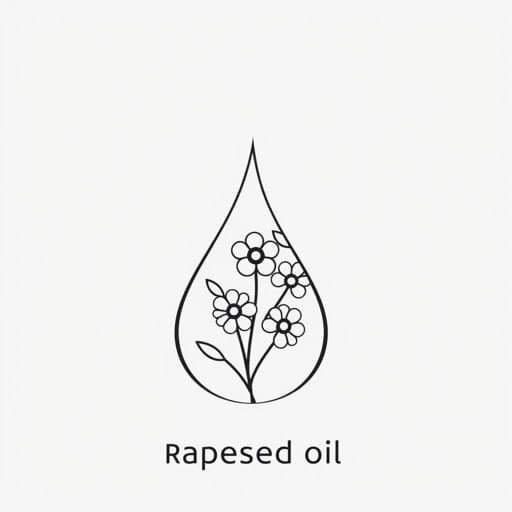When browsing through cooking oils at the supermarket, you might notice a bottle labeled ‘canola oil’ and wonder what it is or how it compares to other vegetable oils. What many people don’t realize is that canola oil is simply another name for a type of rapeseed oil specifically one that has been developed to be low in certain naturally occurring compounds found in traditional rapeseed. The terminology surrounding rapeseed oil can be confusing, but understanding the differences and the evolution of its names helps clarify its widespread use in kitchens and food industries around the world.
The Origin of Rapeseed Oil
What Is Rapeseed?
Rapeseed is a bright-yellow flowering plant belonging to the mustard or cabbage family. Historically, its seeds have been pressed to extract oil, which has been used for both culinary and industrial purposes. However, traditional rapeseed oil contained high levels of erucic acid, a substance considered unhealthy in large quantities, as well as glucosinolates, which can give the oil a bitter flavor.
Development of a Safer Alternative
During the 1970s, Canadian agricultural scientists developed a new variety of rapeseed that was low in erucic acid and glucosinolates. This safer version became known as canola, short for ‘Canadian oil, low acid.’ Over time, canola oil became widely accepted as a healthy and versatile cooking oil, distinct from older types of rapeseed oil.
Another Name for Rapeseed Oil: Canola Oil
Why the Name Change?
The rebranding from ‘rapeseed oil’ to ‘canola oil’ was partly due to marketing concerns. The word rape in rapeseed understandably caused discomfort for consumers. By adopting a new name that emphasized its Canadian origins and its improved nutritional profile, the oil gained popularity and market acceptance in North America and beyond.
Where the Term Is Used
The name canola oil is widely used in the United States, Canada, Australia, and some other countries. However, in Europe and parts of Asia, the term rapeseed oil is still commonly used, especially when referring to the refined version that meets modern food safety standards.
Differences Between Rapeseed Oil and Canola Oil
Chemical Composition
Modern edible rapeseed oil and canola oil are very similar, especially when they come from low-erucic acid plants. Here are the key components:
- Low saturated fat
- High monounsaturated fat (particularly oleic acid)
- Moderate levels of polyunsaturated fat (omega-3 and omega-6 fatty acids)
- Virtually no trans fats
Flavor and Culinary Use
Canola oil has a mild, neutral flavor, making it suitable for a wide range of dishes, from salad dressings to deep-frying. Some cold-pressed rapeseed oils, particularly in Europe, may have a nuttier or earthier taste and are used in gourmet cooking or as finishing oils.
Health Benefits of Canola and Rapeseed Oils
Heart Health
Due to its low saturated fat content and high levels of heart-friendly monounsaturated fats, canola oil is often recommended for heart health. It may help reduce bad LDL cholesterol when used in place of saturated fats such as butter or lard.
Omega-3 Fatty Acids
Canola oil contains a modest amount of alpha-linolenic acid (ALA), a plant-based omega-3 fatty acid that contributes to brain and cardiovascular health. While not as rich in omega-3s as flaxseed or fish oil, it offers a useful balance for everyday cooking.
Vitamin E and Antioxidants
Both canola and modern rapeseed oil varieties contain vitamin E, a natural antioxidant that supports skin and immune function. This makes them not only nutritious but also shelf-stable for longer periods.
Common Uses of Rapeseed and Canola Oil
In Cooking and Baking
Thanks to its light texture and neutral flavor, canola oil is one of the most versatile cooking oils. It is used in:
- Stir-frying and sautéing
- Deep-frying
- Baking cakes, muffins, and cookies
- Making salad dressings and marinades
In the Food Industry
Commercial food producers use canola oil in a variety of packaged goods due to its stability and cost-effectiveness. It is often found in:
- Snack foods like chips and crackers
- Bottled sauces and dressings
- Margarine and spreads
- Processed baked goods
Non-Culinary Uses
Beyond food, rapeseed oil is also used in non-edible products like:
- Biofuels and biodiesel
- Soaps and lubricants
- Cosmetics and skincare items
How to Choose a Quality Oil
Cold-Pressed vs. Refined
Cold-pressed rapeseed oil retains more nutrients and has a richer flavor, but it may not be suitable for high-heat cooking. Refined canola oil has a higher smoke point and a cleaner taste, making it better for frying or baking.
Organic and Non-GMO Options
Look for oils labeled organic or non-GMO if you prefer products without genetically modified organisms or synthetic pesticides. These options are increasingly available in health food stores and large supermarkets.
Packaging and Storage
Choose oils in dark glass bottles or metal cans to protect them from light. Store them in a cool, dark place to maintain freshness and prevent oxidation.
Environmental Considerations
Sustainable Farming
Rapeseed is considered one of the more environmentally efficient oilseed crops, especially in cooler climates. Its ability to grow in a variety of soils and conditions makes it an important agricultural product.
Biofuel Production
The growing demand for renewable energy has led to increased production of rapeseed for biodiesel. While this supports sustainability, it also raises concerns about the balance between food and fuel supply.
Another name for rapeseed oil, particularly in countries like the United States and Canada, is canola oil. Though technically a specific variety of rapeseed, canola oil has become the common name for the refined, edible form used in everyday cooking. With its health benefits, culinary versatility, and wide availability, canola oil continues to be a kitchen staple for millions. Understanding the origin and qualities of rapeseed oil and recognizing its different names helps consumers make better, more informed choices when selecting cooking oils for their meals and recipes.
